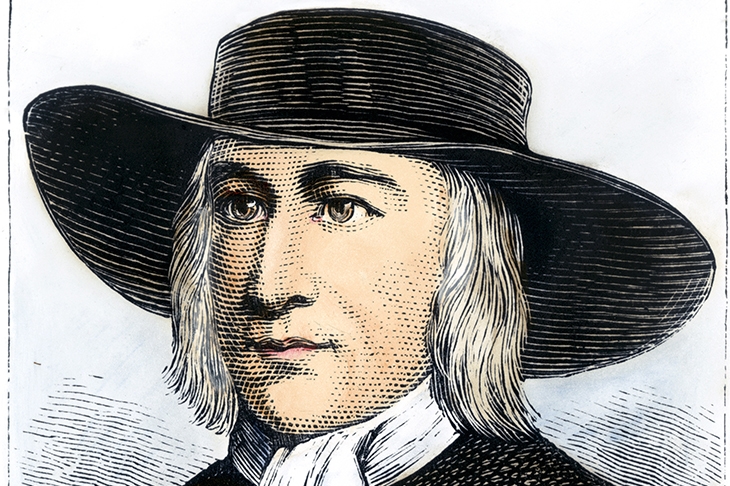The Reformation is such a huge, sprawling historical subject that it makes sense, in this the 500th anniversary of Martin Luther producing his 95 Theses, to break it up into bite-size pieces in order to sample its distinctive local flavours. Eamon Duffy, emeritus professor of Christian history at Cambridge, takes England as his territory, and quickly deprecates the very word Reformation as an ‘unsatisfactory designation concealing a battery of value judgments’. Instead, he sets out to investigate what he characterises as largely a series of homegrown reformations and counter-reformations.
So far, so sensible, but the process of reduction is then taken a step further. Duffy’s ability to shape his scholarship to a wide audience is well known, shown to dazzling effect in The Stripping of the Altars, his groundbreaking 1992 account of the rude good health of late medieval English Catholicism before Henry VIII’s version of the Reformation. Here, however, he offers not a single narrative, but rather a series of 14 essays that range, apparently randomly, from Thomas More’s publication of
Utopia in 1516 to George Fox’s founding of the Quakers in the late 1640s.
Each is individually fascinating, but the whole requires some pretty big leaps of time and faith from his readers, who are not granted the standard epilogue to pull together the threads of essays that have been written and published over a span of four decades. Yet such is the energy, insight and sheer quality of his writing that Duffy pulls it off.
After Hilary Mantel has done so much in Wolf Hall in its various incarnations to create an authorised version of Thomas More as a sour, bigoted bogeyman, as keen on torture as any inquisitor, Duffy defends the ‘man for all seasons’, explains his motivations, and absolves him of many of his sins. The attractive playfulness of More’s Utopia – a ‘thought experiment’, Duffy argues, as More vied with Erasmus of Rotterdam to be the man most likely to lead reform of Catholicism from within — was exiled first and foremost by the advent of Luther.
The Protestant reformer’s insistence that salvation and eternal life came by faith alone, and had no connection to the ‘good works’ done during an individual’s time on earth, had in More’s opinion made virtue irrelevant, and therefore threatened the breakdown of a moral society. The imperative to defeat the Lutheran heresy was for him all-consuming, causing ‘the strange death of Erasmian England’, and ultimately leading to More’s own demise by beheading in 1535, when he was unable to countenance Henry VIII’s force-of-necessity dalliance with Protestantism.
Another to get a makeover in Duffy’s essays is Cardinal Reginald Pole, the last Catholic Archbishop of Canterbury. Indeed, in 1549, Pole had come within a vote of being only the second Englishman elected as Pope. Though one who had sympathy with Luther’s attachment to ‘justification by faith’ over ‘good works’, Pole is today best remembered as right-hand man to ‘Bloody’ Mary, as she put to death those who resisted the return to Catholicism during her reign.
Duffy, however, paints a much more nuanced picture, resisting the caricature of Pole as a Catholic extremist, recognising the strength of many aspects of the Marian counter-reformation, and pointing to his resistance to the hardline Jesuits establishing a base in England. Had Mary lived, what Duffy sees as an essential Catholicism in the English might have drawn them back once more into communion with Rome. Instead, within two generations, that Catholic past had been obliterated.
Among the delights of Duffy’s prose are his crushing verdicts. Cardinal William Allen, who aided and abetted the Spanish Armada and plotted the overthrow of Queen Elizabeth from the seminaries he established for the ‘English mission’ at Douai in France and in Rome, is described thus:
The man courted and honoured by princes, popes, politicians and plotters was a schoolmaster and pamphleteer who in another age might well have enjoyed an uneventful
career in a minor academic post, or ended his days in a cathedral prebend or a north country rectory.
Instead, extraordinary times allowed this lightweight, Duffy judges, to ‘help cement into place English Protestant equation of popery with tyranny and treachery’.
When the professor turns his attention to a not-quite balancing contingent of Protestant reformers, and especially those Puritans who wanted to go beyond the moderation of the Church of England, he is no less clear-sighted. George Fox is perhaps his favourite holy hero, no fanatic but a practical man of God, likened to Saint Francis of Assisi on the basis on their shared ‘charismatic blend of literalness and freedom’.
The missing epilogue notwithstanding, by ending this collection with Fox, Duffy does offer a purer, more practical view of English religion than he has found in those who feature in the previous 13 essays. It gives the fragmented story he tells a narrative arc and therefore a fragile unity.






Comments